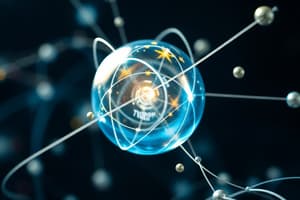Podcast
Questions and Answers
What is the capacity to do work in physics?
What is the capacity to do work in physics?
- Mass
- Momentum
- Energy (correct)
- Force
Which of the following is a key principle of quantum mechanics?
Which of the following is a key principle of quantum mechanics?
- Newton's Laws
- Gravity
- Wave-particle duality (correct)
- Electromagnetic spectrum
What does Newton's Second Law state in terms of mathematics?
What does Newton's Second Law state in terms of mathematics?
- F = ma (correct)
- V = IR
- W = Fd
- KE = 1/2 mv²
What is the study of heat, energy, and work known as?
What is the study of heat, energy, and work known as?
In classical mechanics, which of the following governs the motion of objects?
In classical mechanics, which of the following governs the motion of objects?
What is the correct SI unit for measuring electric current?
What is the correct SI unit for measuring electric current?
Which equation represents the relationship of voltage, current, and resistance?
Which equation represents the relationship of voltage, current, and resistance?
Entropy increases in which type of system?
Entropy increases in which type of system?
Flashcards are hidden until you start studying
Study Notes
Fundamental Concepts of Physics
- Definition: Physics is the study of matter, energy, and the interactions between them.
Branches of Physics
-
Classical Mechanics:
- Deals with the motion of objects and the forces acting on them.
- Key Laws: Newton's Laws of Motion.
-
Thermodynamics:
- Study of heat, energy, and work.
- Key Laws:
- First Law: Conservation of energy.
- Second Law: Entropy increases in an isolated system.
-
Electromagnetism:
- Study of electric charges, electric fields, magnetic fields, and their interactions.
- Key Laws: Coulomb’s Law, Faraday’s Law of Induction.
-
Quantum Mechanics:
- Describes physical phenomena at the atomic and subatomic levels.
- Key Principles: Wave-particle duality, Heisenberg Uncertainty Principle.
-
Relativity:
- Study of the behavior of objects in high-speed motion.
- Key Concepts: Time dilation, mass-energy equivalence (E=mc²).
-
Optics:
- Study of light and its interactions with matter.
- Key Phenomena: Reflection, refraction, diffraction.
Key Terms
- Force: A push or pull on an object.
- Energy: The capacity to do work.
- Work: Force applied over a distance.
- Momentum: Product of mass and velocity of an object.
- Mass: Measure of the amount of matter in an object.
Important Equations
- Newton’s Second Law: F = ma (Force equals mass times acceleration)
- Work Done: W = Fd (Work equals force times distance)
- Kinetic Energy: KE = 1/2 mv²
- Potential Energy: PE = mgh (mass × gravity × height)
- Ohm’s Law: V = IR (Voltage equals current times resistance)
Principles of Measurement
- SI Units: Standard units for measurement in physics.
- Length: Meter (m)
- Mass: Kilogram (kg)
- Time: Second (s)
- Electric current: Ampere (A)
- Temperature: Kelvin (K)
Applications of Physics
- Engineering: Design and analysis of structures and machines.
- Medicine: Imaging techniques (e.g., MRI, X-rays).
- Astronomy: Study of celestial bodies and phenomena.
- Environmental Science: Understanding energy transfer and conservation.
Study Tips
- Focus on understanding concepts rather than memorization.
- Solve practical problems to apply theoretical knowledge.
- Use diagrams and visual aids to comprehend complex ideas.
- Review key formulas regularly and practice their applications.
Fundamental Concepts of Physics
- Physics studies matter, energy, and their interactions, exploring how they affect the natural world.
Branches of Physics
-
Classical Mechanics:
- Analyzes object motion and forces with Newton's Laws of Motion being foundational.
-
Thermodynamics:
- Investigates the relationship between heat, energy, and work, governed by key laws like energy conservation and entropy increase in isolated systems.
-
Electromagnetism:
- Focuses on electric charges and their interactions, encapsulated by Coulomb’s Law and Faraday’s Law of Induction.
-
Quantum Mechanics:
- Explores atomic and subatomic phenomena, highlighting concepts like wave-particle duality and the Heisenberg Uncertainty Principle.
-
Relativity:
- Examines high-speed object behavior, introducing ideas of time dilation and mass-energy equivalence (E=mc²).
-
Optics:
- Studies light and matter interactions, explaining phenomena such as reflection, refraction, and diffraction.
Key Terms
- Force: A push or pull acting on an object.
- Energy: The ability to perform work.
- Work: The result of a force applied over a distance.
- Momentum: The mass-velocity product of an object.
- Mass: Quantifies the amount of matter in an object.
Important Equations
- Newton’s Second Law: F = ma signifies that force is the product of mass and acceleration.
- Work Done: W = Fd demonstrates work as force multiplied by distance.
- Kinetic Energy: KE = 1/2 mv² calculates energy of motion.
- Potential Energy: PE = mgh calculates energy due to position relative to gravity.
- Ohm’s Law: V = IR relates voltage, current, and resistance in electric circuits.
Principles of Measurement
- SI Units: The international standard for measurement in physics includes:
- Length: Meter (m)
- Mass: Kilogram (kg)
- Time: Second (s)
- Electric Current: Ampere (A)
- Temperature: Kelvin (K)
Applications of Physics
- Engineering: Utilizes physics for structural design and machinery.
- Medicine: Applies principles for imaging technologies such as MRI and X-rays.
- Astronomy: Centers on the analysis of celestial objects and events.
- Environmental Science: Explores energy transfer and conservation principles.
Study Tips
- Emphasize understanding concepts over rote memorization.
- Solve practical problems to apply theoretical knowledge.
- Utilize diagrams and visuals for clearer comprehension.
- Regularly review key formulas and practice their applications for mastery.
Studying That Suits You
Use AI to generate personalized quizzes and flashcards to suit your learning preferences.




